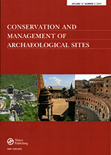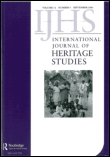
Conservation and Management of Archaeological Sites
Scope & Guideline
Elevating Archaeological Conservation Standards.
Introduction
Aims and Scopes
- Heritage Conservation Practices:
The journal emphasizes the development and application of effective conservation strategies that address both natural and anthropogenic threats to archaeological sites. - Interdisciplinary Approaches:
It promotes interdisciplinary methodologies in archaeological heritage management, combining insights from archaeology, environmental science, sociology, and urban planning. - Community Involvement and Stakeholder Engagement:
The journal recognizes the importance of involving local communities and stakeholders in the conservation process to ensure that heritage management is culturally relevant and sustainable. - Technological Innovations in Heritage Management:
It focuses on the integration of new technologies, such as GIS, digital modeling, and augmented reality, in the documentation and conservation of archaeological sites. - Cultural Heritage and Identity:
The journal explores the relationship between cultural heritage and community identity, addressing how heritage conservation can support social cohesion and cultural continuity.
Trending and Emerging
- Climate Change Adaptation Strategies:
Recent publications highlight the role of traditional knowledge and integrated water management systems as adaptive tools for climate change, emphasizing the need for sustainability in heritage management. - Digital Heritage Management:
There is a surge in papers discussing the decolonization of heritage management and the use of digital tools, reflecting a growing interest in how technology can enhance the preservation and interpretation of cultural heritage. - Community-Centric Heritage Practices:
The trend towards involving local communities in heritage management is gaining traction, with increased focus on citizen science and collaborative approaches to conservation. - Impact of Global Events on Heritage Conservation:
The journal has seen an increase in discussions around the impact of global events, such as the COVID-19 pandemic, on heritage conservation practices, highlighting adaptability and resilience in the field.
Declining or Waning
- Traditional Archaeological Methods:
There has been a noticeable decrease in papers focusing solely on traditional archaeological excavation methods, as the field increasingly emphasizes interdisciplinary and innovative approaches. - Historical Contextualization without Modern Relevance:
Papers that provide historical context without linking it to contemporary issues or modern conservation practices have become less prevalent, indicating a shift toward more applicable and relevant research. - Focus on Material Culture Alone:
Research that solely emphasizes the material aspects of archaeological sites, without considering social, political, or environmental contexts, appears to be waning in favor of more holistic approaches.
Similar Journals

Archeologia e Calcolatori
Fostering Collaboration for a Deeper Understanding of ArchaeologyArcheologia e Calcolatori is a distinguished open-access journal published by EDIZIONI ALL INSEGNA GIGLIO SAS in collaboration with the Italian National Research Council, dedicated to advancing knowledge in the fields of archaeology and its intersections with computational methodologies. Since its inception in 1998, the journal has become a pivotal resource for researchers and practitioners, offering a platform for innovative studies and critical discussions at the forefront of archaeological science. With its current impact reflected in Scopus rankings, Archeologia e Calcolatori is placed in Q2 for both Archaeology and Archaeology (Arts and Humanities), and its commitment to quality scholarship is evident. The journal benefits from open access, ensuring that scholarly findings are readily available to a global audience. By prioritizing the dissemination of interdisciplinary research methods and explorative analyses, it aims to foster collaboration and inspire new directions in archaeological and computational research.

DENKMALPFLEGE
Innovating Techniques for Monument Restoration.DENKMALPFLEGE is a prestigious journal published by DEUTSCHER KUNSTVERLAG GMBH, focusing on the field of cultural heritage conservation and restoration. With its ISSN 0947-031X and E-ISSN 2569-1589, this publication serves as an essential resource for researchers, professionals, and students dedicated to the preservation of historical monuments and sites. Although the journal does not currently offer open access, it provides a valuable wealth of scholarly articles, case studies, and reviews that critically engage with contemporary debates in conservation practices. Published in Munich, Germany, it bridges academic research with practical applications, underlining its importance in enhancing the discourse surrounding heritage preservation. Alongside its historical coverage from 2009 to 2012, DENKMALPFLEGE continues to be a vital platform for advancing knowledge in the field, promoting best practices, and fostering collaboration among experts.

Virtual Archaeology Review
Bridging Heritage and Technology for a Sustainable Tomorrow.Virtual Archaeology Review, published by UNIV POLITECNICA VALENCIA, EDITORIAL UPV, is a distinguished open-access journal dedicated to the dynamic fields of archaeology and conservation. Based in Spain, this journal has made a significant impact in the academic community, reflected in its outstanding Q1 ranking in Archeology and Conservation for 2023, alongside impressive standings in related disciplines such as Computer Science Applications. With an active commitment to promoting the accessibility of knowledge since 2010, it provides a platform for researchers, professionals, and students to share innovative findings and methodologies in virtual archaeology, fostering collaboration across disciplines. The journal's impact factor and its strategic focus on advancing the practice of virtual methodologies in archaeology underscore its vital role in bridging technology and heritage studies. By embracing a multidisciplinary approach, Virtual Archaeology Review not only enhances academic discourse but also drives the development of effective conservation strategies, making it an essential resource for those dedicated to the preservation and appreciation of our cultural heritage.

Conservar Patrimonio
Unveiling Insights for Heritage Preservation.Conservar Patrimonio is a leading academic journal dedicated to the fields of conservation and museology, published by the ASSOC PROFISSIONAL CONSERVADORES-RESTAURADORES PORTUGAL. Established as an open access platform since 2005, it aims to disseminate high-quality research and innovations essential for the preservation of cultural heritage. With an impressive 2023 impact factor, Conservar Patrimonio holds a Q2 ranking in Conservation and a Q1 ranking in Museology, reflecting its significant contribution to both disciplines. The journal is indexed amongst the top 30% of publications in the Museology category and offers valuable insights into the methodologies and practices that shape the conservation of cultural artifacts. Researchers, professionals, and students are encouraged to engage with the latest findings, case studies, and theoretical explorations presented in this esteemed journal based in Portugal, enhancing the global dialogue on conservation practices.

International Journal of Conservation Science
Shaping the Future of Conservation through CollaborationThe International Journal of Conservation Science, published by the Romanian Inventors Forum, is a premier, Open Access journal dedicated to advancing the field of conservation science since its foundation in 2010. With a strong emphasis on interdisciplinary research, the journal welcomes contributions that explore innovative methodologies and sustainable practices in conservation. Based in Romania, the journal boasts an impact factor that positions it as a leading voice in its field, reflected by its Q1 ranking in Conservation and notable placements within its categories in Scopus. With coverage spanning diverse areas from natural resource management to environmental education, the journal serves as a crucial platform for researchers, policymakers, and practitioners aiming to drive impactful conservation strategies globally. The International Journal of Conservation Science not only enhances the visibility of significant research but also promotes open dialogue and collaboration among professionals committed to preserving our natural heritage.

PRESERVATION
Fostering Understanding in Preservation ChallengesPRESERVATION is a distinguished journal published by the NATL TRUST HISTORIC PRESERVATION, focusing on critical issues in historic preservation and conservation within the realm of arts and humanities. With an ISSN of 1090-9931, this journal served as a notable platform for research and discourse from 2002 to 2018, although its coverage was discontinued in Scopus, where it held ranks that reflected its niche but valuable contributions to both visual arts and conservation. Despite its cessation, the journal remains a key resource for professionals and academics dedicated to preserving cultural heritage and advancing the study of preservation practices. The importance of PRESERVATION lies in its commitment to fostering an understanding of the challenges in maintaining historical integrity amidst modern developments. Researchers, practitioners, and students alike will find a wealth of knowledge and inspiration through its past issues, making it an essential reference point for those engaged in the ongoing dialogue around preservation methodologies and impacts.

Egyptian Journal of Archaeological and Restoration Studies
Bridging Disciplines in Archaeology and Conservation.Welcome to the Egyptian Journal of Archaeological and Restoration Studies, a vital resource for scholars and practitioners in the field of archaeology and restoration. Published by the renowned SOHAG UNIV PUBLICATION CENTER-SUPC, this journal aims to disseminate cutting-edge research that illuminates the rich archaeological heritage of Egypt and beyond. With ISSN 2090-4932 and E-ISSN 2090-4940, this journal showcases innovative methodologies and interdisciplinary approaches, significantly contributing to our understanding of cultural heritage preservation. The journal's growing influence is reflected in its Q3 ranking in multiple categories, including Archaeology, Conservation, and Cultural Studies as of 2023, alongside its noteworthy placement within the Social Sciences. Open access options provide wider accessibility to essential studies, making it an indispensable tool for researchers, professionals, and students alike. Join us in exploring the past and shaping the future of archaeological scholarship.

Revista Eletronica Ventilando Acervos
Showcasing Local Research with Global ImpactRevista Eletronica Ventilando Acervos, with ISSN 2318-6062, is a pioneering academic journal published by the esteemed MUSEU VICTOR MEIRELLES-IBRAM, dedicated to the exploration and dissemination of research in the field of archival studies, museum studies, and heritage conservation. As an open-access journal, it provides unrestricted access to a wealth of scholarly articles, promoting the sharing of knowledge and innovative practices among researchers, professionals, and students alike. Situated in Florianópolis, Brazil, the journal not only showcases local research but also contributes to global discourse on cultural heritage and information management. With a vision to foster collaboration and dialogue within the academic community, Revista Eletronica Ventilando Acervos plays a pivotal role in enriching our understanding of archival science and its impact on society, making it an invaluable resource for anyone engaged in this dynamic field.

Mediterranean Archaeology & Archaeometry
Innovating Research in Archaeometry and HistoryMediterranean Archaeology & Archaeometry is a premier academic journal dedicated to advancing the fields of archaeology, anthropology, conservation, and history, published by UK Zhende Publishing Ltd. With its ISSN 1108-9628 and E-ISSN 2241-8121, this journal serves as a vital platform for scholars and practitioners to disseminate innovative research and findings related to the rich archaeological heritage of the Mediterranean region. It has gained remarkable recognition, achieving a Q2 ranking in anthropology and archaeology, and a Q1 classification in several categories including arts and humanities, conservation, and history as of 2023. Its impressive Scopus rankings underscore its impact, with a significant position in history (59/1760) and conservation (11/103) disciplines. Spanning years from 2008 to 2022, the journal invites open access contributions to foster collaboration and interdisciplinary dialogue among researchers, students, and professionals alike, making it an indispensable resource for those engaged in the exploration and preservation of historical narratives within the Mediterranean context.

International Journal of Heritage Studies
Navigating the complexities of cultural management.Welcome to the International Journal of Heritage Studies, a prestigious publication dedicated to advancing knowledge in the fields of heritage conservation, cultural studies, and museology. Published by Routledge Journals, Taylor & Francis Ltd in the United Kingdom, this journal boasts an impressive impact ranking, positioned in the Q1 category for multiple disciplines, including Conservation and Cultural Studies, and a remarkable HIndex indicative of its influence within academia. With a history spanning from 1994 and continuing to 2024, the journal serves as an essential platform for researchers, professionals, and students aiming to contribute to the dynamic discourse surrounding heritage preservation and cultural management. Although the journal does not offer open access, it remains a vital resource for those interested in the nuanced intersections of heritage and society, as evidenced by its high ranks in various academic categories. The International Journal of Heritage Studies is committed to fostering innovative research and critical analysis in its field, inviting submissions that explore diverse methodologies and theoretical perspectives.